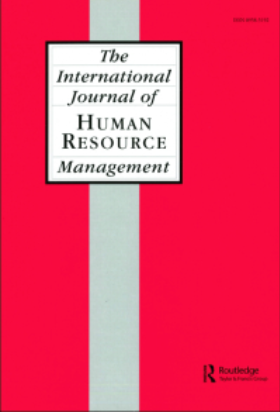管理咨询在员工声音压力方面是如何适得其反的?
IF 5.9
2区 管理学
Q1 MANAGEMENT
International Journal of Human Resource Management
Pub Date : 2023-10-02
DOI:10.1080/09585192.2023.2263347
引用次数: 0
摘要
在对管理咨询的回应中,员工很可能会成为“应声虫”。在本文中,我们提出了声音压力的概念,并探讨了其在管理咨询和不同声音后果(即挑战与支持的声音)中的前因。通过对中国大陆346名员工及其直接领导的滞后调查,我们发现管理咨询可能导致员工声音压力。我们还发现,在控制社会交换机制(即领导-成员交换)和赋能机制(即话语权效能)后,“管理协商-话语权压力-挑战话语权”的关系为负,“管理协商-话语权压力-支持话语权”的关系为正。此外,这些间接关系在员工权力距离倾向较高(相对较低)时更为明显。我们为管理咨询的解释提供了一个新的视角;它给员工施加了声音压力,使他们更有可能成为经理的唯唯诺诺克者。因此,期待建设性的挑战性意见的管理者应该根据员工对权力不平等的态度(即权力距离取向)有选择地、谨慎地进行咨询。关键词:管理咨询声音压力挑战声音支持声音员工权力距离取向披露声明作者未报告潜在的利益冲突。数据可用性声明本研究使用的数据可根据通讯作者的合理要求获得。本研究由中国国家自然科学基金(NSFC - 72072058 & 71732007)资助。本文章由计算机程序翻译,如有差异,请以英文原文为准。
How does managerial consultation backfire pertaining to employee voice pressure?
AbstractIn response to managerial consultation, employees are likely to be pressured yes-persons. In this paper, we propose the concept of voice pressure and explore its antecedent of managerial consultation and differential voice consequences (i.e. challenging vs. supportive voice). Using a time-lagged survey of 346 employees and their direct leaders in mainland China, we found that managerial consultation could lead to employee voice pressure. We also found that after controlling for the social exchange mechanism (i.e. leader-member exchange) and enabling mechanism (i.e. voice efficacy), the ‘managerial consultation-voice pressure-challenging voice’ relationship is negative, while the ‘managerial consultation-voice pressure-supportive voice’ relationship is positive. Furthermore, these indirect relationships are pronounced when employee power distance orientation is higher (vs. lower). We provide a new perspective for the interpretation of managerial consultation; it puts voice pressure on employees and makes them more likely to be managers’ yes-persons. Therefore, managers who expect constructive challenging ideas should conduct consultation selectively and discreetly according to employees’ attitudes towards power inequalities (i.e. power distance orientation).Keywords: Managerial consultationvoice pressurechallenging voicesupportive voiceemployee power distance orientation Disclosure statementNo potential conflict of interest was reported by the author(s).Data availability statementThe data used for this study are available from the corresponding author upon reasonable request.Additional informationFundingThis study was financially supported by the National Science Foundation of China (NSFC - 72072058 & 71732007).
求助全文
通过发布文献求助,成功后即可免费获取论文全文。
去求助
来源期刊
CiteScore
11.70
自引率
7.10%
发文量
77
期刊介绍:
International Journal of Human Resource Management is the forum for HRM scholars and professionals worldwide. Concerned with the expanding role of strategic human resource management in a fast-changing global environment, the journal focuses on future trends in human resource management, drawing on empirical research in the areas of strategic management, international business, organizational behaviour, personnel management and industrial relations that arise from: -internationalization- technological change- market integration- new concepts of line management- increased competition- changing corporate climates Now publishing twenty-two issues per year, The International Journal of Human Resource Management encourages strategically focused articles on a wide range of issues including employee participation, human resource flow, reward systems and high commitment work systems. It is an essential publication in an exciting field, examining all management decisions that affect the relationship between an organization and its employees. Features include; -comparative contributions from both developed and developing countries- special issues based on conferences and current issues- international bibliographies- international data sets- reviews

 求助内容:
求助内容: 应助结果提醒方式:
应助结果提醒方式:


